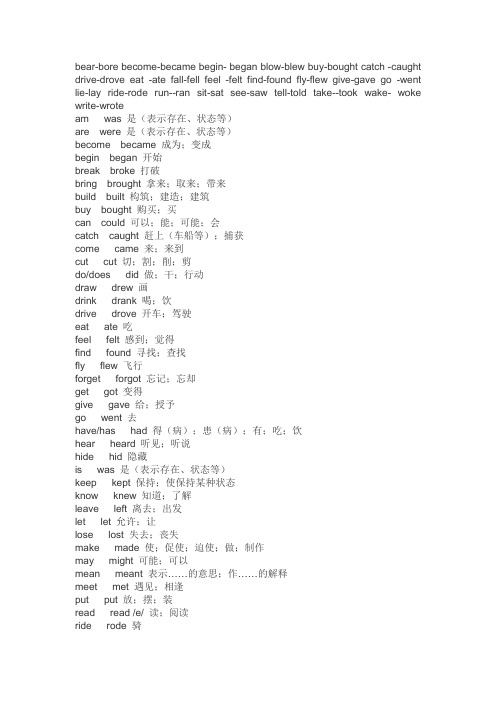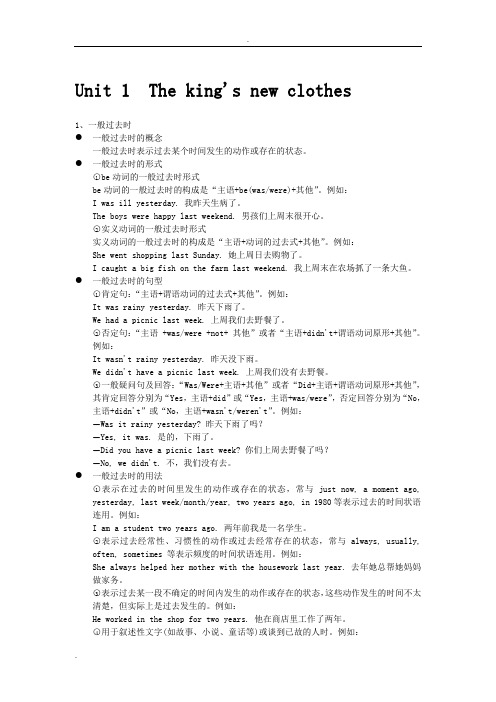六年级过去式知识点
- 格式:docx
- 大小:37.85 KB
- 文档页数:6

六年级英语上册动词过去式规则动词的过去式不规则动词的过去式动词过去式归类总结一、动词过去式的规则变化1.一般情况下,动词词尾加-ed如:work ---worked, play---played, want----wanted, act----acted2.以不发音的-e 结尾动词,动词词尾加-d 把动词原形最后的e去掉,加e/ed如:live---lived, move----moved, like--liked, hope---hoped二、动词过去式的不规则变化1. 把动词原形中的o改为a,变成过去式。
如:become—became, come—came2.把动词原形中的i改为a,变成过去式。
如:begin—began,drink—drank,give—gave,ring—rang,sing—sang,sit—sat,swim—swam3.把重读开音节中的i改为o,变成过去式。
如:drive—drove,ride—rode,win—won,write—wrote4.动词原形中的e改为o,变成过去式。
如:get—got,forget—forgot5.动词原形中的eep改为ept,变成过去式。
如:keep—kept,sleep—slept,sweep—swept6. 动词原形中的an改为oo,变成过去式。
如:stand—stood,understand—understood7.改动词原形中的aw /ow为ew,变成过去式。
如:draw—drew,grow—grew,know—knew,throw—threw(动词show除外,show—showed)8.动词原形中的eak改为oke,变成过去式。
如:break—broke,speak—spoke9.动词原形中的ell改为old,变成过去式。
如:sell—sold,tell—told10.以ought和aught结尾,且读音是[:t]的过去式。
如:bring—brought,buy—bought,think—thought,catch—caught,teach—taught11.以ould结尾且读音为[ud]的情态动词过去式。

六年级英语过去式表am/is---was are---were write----wrotebegin----began buy---bought win----wonbring---brought catch----caught come---came cut---cut can---could teach----taughtdo(does)---did drink---drank draw---drewdrive---drove eat---ate feel----feltfind---found fly---flew forget---forgotget---got go---went give---gavegrow---grew have----had hear---heardhurt----hurt keep----kept know----knewleave----left let----let lose----lostlie----lay make----made meet----metput----put read----read ride----rodering-----rang run----ran say---saidsleep---slept see----saw sell----soldshow----showed sit-----sat sing----sing understand-----understood speak-----spoke stand-----stood steal----stole swim----swam take---tooktell-----told think-----thought wear---woream/is---was are---were write----wrotebegin----began buy---bought win----wonbring---brought catch----caught come---came cut---cut can---could teach----taughtdo(does)---did drink---drank draw---drewdrive---drove eat---ate feel----feltfind---found fly---flew forget---forgotget---got go---went give---gavegrow---grew have----had hear---heardhurt----hurt keep----kept know----knewleave----left let----let lose----lostlie----lay make----made meet----metput----put read----read ride----rodering-----rang run----ran say---saidsleep---slept see----saw sell----soldshow----showed sit-----sat sing----sing understand-----understood speak-----spokestand-----stood steal----stole swim----swamtake---took tell-----told think-----thought wear---wore。

小学英语现在分词与过去式一、现在分词:1.一般在动词后加—ing(含以“y”结尾的词)。
fly(ing) /cry(ing) /study(ing)/buy(ing)…2.以不发音的字母“e”结尾的动词,去“e”,加-ing:live→living住skate→skating 滑冰have→having有另:【come来become变成arrive到达like喜欢 invite邀请 close关掉 smile微笑welcome 欢迎write 写 shine发光;照耀 take 拿lose丢失,迷路 make 制作slide滑…】3.小学动词双写最后辅音字母,再加—ing的词有:plan→planning 计划let→letting 让get→getting 取、得到forget→forgetting 忘记sit→sitting 坐swim→swimming 游泳begin→beginning 开始 win→winning赢,获胜skip →skipping跳绳 stop→stopping 停止shop→shopping 购物 put→putting 放cut→cutting 切、割run→running 跑步hit→hitting打撞击另:【chat聊天/set 设置 /beg乞求/spit吐痰/ /dig 挖、掘/fit合适 /nod点头/hug拥抱 /shut关闭】二、动词的过去式1.一般在动词后加—ed:walk走路、步行help帮point指、指向 laugh笑 play玩 work工作 comb梳talk说话;交谈reach到达 remember记得look看cook煮饭need 需要 wash洗relax放松 call称呼、叫 answer 回答 ask 问 want 想、想要happen 发生comb 梳ski滑雪pass 传递visit 访问;拜访;参观jump跳蹦跳brush刷thank谢谢show 展示learn学习 open打开 count数unlock 开锁 splash 泼;溅 yell 欢呼bloom 开花……2.以不发音的字母“e”结尾的动词,直接加-d:arrive(d)到达like(d)喜欢 invite(d)邀请 skate(d)溜冰 close(d)关掉live(d)住 smile(d) 微笑 welcome(d) 欢迎3.辅音字母+尾—y,变“y”为“i”加—ed:cry→cried 哭 dry→dried擦干,弄干 study→studied学习4.双写最后辅音字母,再加—ed的词有:plan(ned)计划skip(ped)跳绳stop(ped) 停止shop(ped)购物另:【chat(ted)聊天beg(ged)乞求nod(ded)点头hug(ged)拥抱】5.不规则的动词:get→got 取、得到forget→forgot 忘记win→won赢,获胜 wake→woke醒drive→drove驾驶write →wrote写 shine→shone发光 ride→rode骑车come→came来 become→became 变成sit→sat 坐swim→swam 游泳sing→sang唱;唱歌 drink→drank喝 run→ran跑begin→began 开始 give→gave给drink→drank喝speak→spoke讲说break→broke 打破 stand→stood站立、站 take →took拿buy →bought买 bring→brought带来 think→thought想 teach →taught教 catch→caught抓can→could能、会will→would 将要 keep→kept坚持sweep→swept打扫sleep→slept睡觉throw →threw扔 know→knew知道了解 grow→grew 生长 blow→blew吹draw→drew画fly→flew放飞sell→sold卖tell→told告诉let→let让 put→put 放cut→cut 切、割 hurt→hurt伤,刺痛 hit→hit打撞击cost→ cost花费read→read/red/读feel→felt感觉fall→fell跌倒am/is→was are→were do→did 做go→wen去,走leave→left离开see→saw看见 eat→ate吃 bend →bent 鞠躬 send→sent寄出lie→lay躺 lose→lost丢失,迷路 make →made制作 may →might可以say→said说wear→wore 穿戴 fall→fell 落、跌倒have→had 有 find→found找到 slide →slid滑meet→met遇见 hear→heard听见。

bear-bore become-became begin- began blow-blew buy-bought catch -caught drive-drove eat -ate fall-fell feel -felt find-found fly-flew give-gave go -went lie-lay ride-rode run--ran sit-sat see-saw tell-told take--took wake- woke write-wroteam was 是(表示存在、状态等)are were 是(表示存在、状态等)become became 成为;变成begin began 开始break broke 打破bring brought 拿来;取来;带来build built 构筑;建造;建筑buy bought 购买;买can could 可以;能;可能;会catch caught 赶上(车船等);捕获come came 来;来到cut cut 切;割;削;剪do/does did 做;干;行动draw drew 画drink drank 喝;饮drive drove 开车;驾驶eat ate 吃feel felt 感到;觉得find found 寻找;查找fly flew 飞行forget forgot 忘记;忘却get got 变得give gave 给;授予go went 去have/has had 得(病);患(病);有;吃;饮hear heard 听见;听说hide hid 隐藏is was 是(表示存在、状态等)keep kept 保持;使保持某种状态know knew 知道;了解leave left 离去;出发let let 允许;让lose lost 失去;丧失make made 使;促使;迫使;做;制作may might 可能;可以mean meant 表示……的意思;作……的解释meet met 遇见;相逢put put 放;摆;装read read /e/ 读;阅读ride rode 骑ring rang (铃)响rise rose 上升run ran 跑;奔跑say said 说;讲see saw 看见send sent 发送;寄;派;遣set set 放, 置show showed 出示;给……看shut shut 关上(门、盖、窗户等)sing sang 唱;唱歌sit sat 坐Speak spoke 说;说话sleep slept 睡;睡觉swim swam 游泳take took 搭乘;花费(时间);拿走;带到teach taught 教;讲授tell told 告诉;讲述think thought 想;思考will would 将要win won 赢;获胜write wrote 书写。

六年级英语必考知识点公式一、英语时态1. 一般现在时:主语 + 动词原形(第三人称单数在动词原形后加-s)例句:Tom likes playing basketball.2. 一般过去时:主语 + 动词过去式(动词过去式根据规则变化)例句:Sarah watched a movie last night.3. 现在进行时:主语 + be (am/is/are) + 动词-ing例句:They are studying for the exam.4. 过去进行时: 主语 + was/were + 动词-ing例句:She was reading a book when I saw her.5. 过去将来时: 主语 + would + 动词原形例句:He said he would come to the party.6. 现在完成时: 主语 + have/has + 动词过去分词例句:I have finished my homework.二、疑问句及否定句1. 疑问句: 助动词/Be动词/情态动词 + 主语 + 动词原形例句:Do you like ice cream? Is he coming?2. 否定句: 主语 + do/does/did not + 动词原形例句:She does not play tennis. They did not go to the park.三、单复数形式1. 名词的复数形式: 大部分名词 + s/es例句:Apples, books, boxes2. 动词的第三人称单数形式: 动词原形 + s例句:He likes to play soccer. She sings beautifully.四、情态动词的用法1. can: 表示能力、允许例句:I can swim. Can I borrow your pen?2. must: 表示必须例句:You must finish your homework.3. should: 表示建议、应该例句:We should study hard for the exam.五、比较级和最高级1. 比较级:形容词/副词 + er例句:She is taller than me.2. 最高级:形容词/副词 + est例句:He is the tallest boy in our class.六、介词1. in:表示在某个位置或某段时间内例句:I live in a big house. We will have a meeting in the afternoon.2. on:表示在某个表面或某个特定的日期例句:Put the book on the table. My birthday is on October 10th.七、连词1. and:表示并列关系例句:I like apples and oranges.2. but:表示转折关系例句:She is tired but happy.八、日常表达1. 问候语: Hello! Hi! Good morning! Good afternoon! Good evening! How are you?例句:Hello! How are you today?2. 道别语: Goodbye! Bye! See you later! See you tomorrow!例句:Goodbye! See you tomorrow!以上是六年级英语必考知识点的公式总结。


Unit 1 The king's new clothes1、一般过去时●一般过去时的概念一般过去时表示过去某个时间发生的动作或存在的状态。
●一般过去时的形式○1be动词的一般过去时形式be动词的一般过去时的构成是“主语+be(was/were)+其他”。
例如:I was ill yesterday. 我昨天生病了。
The boys were happy last weekend. 男孩们上周末很开心。
○2实义动词的一般过去时形式实义动词的一般过去时的构成是“主语+动词的过去式+其他”。
例如:She went shopping last Sunday. 她上周日去购物了。
I caught a big fish on the farm last weekend. 我上周末在农场抓了一条大鱼。
●一般过去时的句型○1肯定句:“主语+谓语动词的过去式+其他”。
例如:It was rainy yesterday. 昨天下雨了。
We had a picnic last week. 上周我们去野餐了。
○2否定句:“主语 +was/were +not+ 其他”或者“主语+didn't+谓语动词原形+其他”。
例如:It wasn't rainy yesterday. 昨天没下雨。
We didn't have a picnic last week. 上周我们没有去野餐。
○3一般疑问句及回答:“Was/Were+主语+其他”或者“Did+主语+谓语动词原形+其他”,其肯定回答分别为“Yes,主语+did”或“Yes,主语+was/were”,否定回答分别为“No,主语+didn't”或“No,主语+wasn't/weren't”。
例如:—Was it rainy yesterday? 昨天下雨了吗?—Yes, it was. 是的,下雨了。
—Did you have a picnic last week? 你们上周去野餐了吗?—No, we didn't. 不,我们没有去。

完整版)六年级英语语法知识点汇总六年级语法总复一、词汇一)一般过去时态一般过去时态表示在过去的某个时间发生的动作或存在的状态,通常与表示过去的时间状语连用,如yesterday。
last weekend。
last Saturday等。
基本句型为:“主语+动词的过去式+其他”。
例如:“What did you do last weekend?”,“I played football last weekend.”规则动词过去式的构成1.一般在动词原形末尾加-ed,如play—played。
2.词尾是e的动词直接加-d,如dance—danced。
3.末尾只有一个辅音字母的重读闭音节词,先双写这个辅音字母,再加-ed,(停止)ped。
4.结尾是“辅音字母+y”的动词,变“y”为“i”,再加-ed,如study--studied。
一些不规则变化的动词过去式am/is—was,are—were,see—saw,take—took,read—read,sleep(睡觉)—slept,go—went,come—came,swim—swam,fly—flew,e—became,do—did,get—got,have—had,draw—drew,say—said,hurt—hurt,win—won,tell—told,will—would,eat—ate,cut(切)--cut,sit(坐)—sat,think—thought,find—found,make—made,drink—drank,run(跑)—ran,wear—wore,begin(开始)—began,buy—bought,give(给)—gave,sing—sang。
二)一般现在时态一般现在时态表示包括现在时间在内的一段时间内经常发生的动作或存在的状态,表示惯性或客观存在的事实和真理,通常与often。
always。
usually。
sometimes。


一般过去时(一)定义:表示过去发生的动作或者事情。
时间状语:last year/month/week… ten years agoYesterday/the day before yesterday构成:1.主语+be动词过去式[was(am,is的过去式)/were(are的过去式)]2.主语+动词的过去式(did)特别提醒:切忌不要随便加be动词(was/were),有be动词的时候表示的是过去存在的状态,was/were不能同时和其他动词一起出现。
1.含有be动词的过去时(表示过去存在的状态)Eg: Cherry was thin ten years ago.Cherry ________thin ten years ago.(否定句)______ Cherry thin ten years ago? (疑问句)Yes, she was. No, She wasn’t.Where were you yesterday?2.含有实意动词的过去时(表示过去发生的动作)Eg: They played basketball last night.They ____________ basketball last night.(否定句)_____ they________ basketball last night?(疑问句)Yes,they did. No,they didn’t.Where did he go last Monday?动词过去式的变化规律例词1)以字母e结尾的动词,则只加d use-used dance-danced2)以辅音字母加y结尾,把y改成i,再加edstudy-studied carry-carried注意:play-played,因为它是元音加y结尾。
stop-stopped shop-shopping3)以重读闭音节结尾的动词,则要双写最后一个字母,再加上ed.4)一般在动词的后面加上ed. look-looked walk-walked专项训练Ex.1用所给动词的适当形式填空。

Lesson 1一、动词及过去式look-looked learn-learned work-worked read-readstay-stayed play-played go-went write-wrotedo-did visit-visited have/has-had make-made二、重点词组went back to Canada回加拿大了had a great time过的愉快did many things做了许多事情visited my grandparents看望我爷爷奶奶played with my friends 和我的朋友玩just stayed in Beijing待在北京Worked on my uncle’s farm在我叔叔的农场劳动went swimming去游泳learned to sing Peking Opera学唱京剧visited some museums参观一些博物馆played with my cousins和我的堂兄弟姐妹玩had an interesting vacation度过了一个有意思的假期三、重点句型What did you do this summer?I went back to Canada.What did Lanlan do this summer?She wrote a story.What did Qiangqiang do this summer?He made cakes.四、我会说I went to Niantan park .I had a great time ,and did many things.I went to the beach. I played with my friends .I had an interesting vacation. Lesson 2一、动词及过去式不规则:(1)do—did (2)come—came (3)swim—swam (4)go—went(5)catch—caught(6)let—let (7)am/is—was (8)are—were(9)take—took (10)have/has—had规则:(1)climb—climbed二、重点词组(1)come back (2)summer camp (3)last Thursday (4)climbed themountains 回来夏令营上周四爬山(5)swam in the river (6)went fishing (7)caught three fish在河里游泳去钓鱼抓了三条鱼(8)good for you (9)had a lot of fun你真好过的非常快乐三、重点句型When did you come back? When did she finish the piano lesson?I came back last Thursday. She finished piano lessons last week.When did he go to the airport?He went to the airport last Monday morning.四、我会说My parents and I took a trip last weekend..I flew to Hangzhou. We went there by airWe visited many places and saw green hills, blue water, small bridges, and old houses.We came back last weekend.Today I was happy.Today we had a lot of fun.Lesson 31.动词及过去式do—didbuy—boughtgive—gavelike—liked2.重点句型Did you go to see your grandparents?Yes, I did./No, I didn’t.Did you return the books?Yes, I did./No, I didn’t.Did they win the football match?Yes, I did./No, I didn’t.3 .重点词组a pair of Chinese shoes a pair of glassesSure, what can I do for you? No problem.4.我会说My parent and I went to Xiangshan by car last weekend. We saw a lot of colourful leaves on the hills. We walked around and took many photos. We stayed there for three hours and went back home.Lesson5一、重点单词wrong aches terribly practice kung fu有问题的疼很非常练习功夫Interested lucky dangerous X-ray neck对…感兴趣幸运危险的X-射线脖子二、动词及其过去式happen-happened stand-stood do-did want-wanted 发生站立做想要think-thought is-was hurt-hurt don‘t-didn’t认为,想是受伤没有,不是isn’t -wasn’t不是三、重点词组My neck aches terribly practice kung fu be interested in 脖子疼的厉害练习中国功夫对----感兴趣四、重点句子1. What’s wrong with you? 你怎么了?2. What’s happened to your neck? 你的脖子怎么了?3. I’m very interested in it. 我对这个非常感兴趣。

六年级语法总复习一、词汇(一)一般过去时态一般过去时态表示在过去的某个时间发生的动作或存在的状态,常和表示过去的时间状语连用。
例如yesterday, last weekend ,last Saturday ,等连用。
基本句型:主语+动词的过去式+其他。
例句—— What did you do last weekend?你上周做什么了?—— I played football last weekend. 我踢足球了。
★规则动词过去式的构成⒈一般在动词原形末尾加-ed。
例如: play— played⒉词尾是 e 的动词直接加 -d。
例如: dance— danced⒊末尾只有一个辅音字母的重读闭音节词,先双写这个辅音字母,再加-ed。
例如 stop(停止) --stopped⒋结尾是“辅音字母 +y ”的动词,变“ y”为“ i”,再加 -ed,例如: study--studied★一些不规则变化的动词过去式am/is—was are— were go— went swim — swam fly — flew do— did have— had say— said see—sawtake— took come— came become— became get— got draw— drew hurt— hurt read— read tell —told will — would eat— ate take— took make— made drink —drank sleep( 睡觉 )—slept cut(切) --cut sit( 坐 )—satbegin( 开始 )— began think — thought find — found run( 跑 )---ran buy — bought win —won give( 给 )— gave sing— sang leave— left hear(听) --heart wear— wore(二)一般现在时态一般现在时态表示包括现在时间在内的一段时间内经常发生的动作或存在的状态,表示习惯性或客观存在的事实和真理。

六年级下册英语eM3U1课文过去式归纳1、do-did 做2、are-were 是3、swim-swam 游泳4、sleep-slept 睡觉5、go-went 去6、have-had 有7、buy-bought 买8、am、is-was 是9、come-came 来10、dig-dug 挖11、eat-ate 吃12、draw-drew 画13、get-got 得到14、drive-drove 驾驶15、catch-caught 抓住16、sit-sat 坐17、begin-began 开始18、know-knew 知道19、run-ran 跑20、let-let 让21、read-read 读22、see-saw 看23、meet-met 遇见24、think-thought 想,认为25、teach-taught教26、spend-spent 花费27、write-wrote 写28、tell-told 告诉29、find-found 发现30、make-made 制作31、stand-stood 站32、wear-wore 穿33、put-put 放34、take-took 拿,35、bring-brought带来36、grow-grew 种植37、throw-threw 投掷38、forget-forgot 忘记39、feed-fed 喂养、饲养40、keep-kept 保持41、sweep-swept 打扫42、speak-spoke 说话、讲话43、can-could 能44、say-said 说45、study-studied 学习46、fly-flew 放、飞47、sell-sold 卖、出售48、sing-sang 唱歌49、wake-woke 醒来。


一,概念表示在过去某个时间里所发生的动作或存在的状态。
通常在句子里找到表示过去时间的词或词组。
如:yesterday, yesterday morning, yesterday afternoon, yesterday evening, the day before yesterday, last night, last week, last month, lastyear, a moment ago, just now, two days ago, a week ago, in 1990等。
如: I went to bed at eleven last night.昨晚我11:00睡觉。
二动词过去式的构成规律(一)规则动词的过去式1,一般情况下 +,在动词原形后面加-ed;Look--- looked play----played start--- started visit—visited2,以不发音 e 结尾的动词,在词尾直接加-d;Live —lived use---used3,以“辅音字母+y”结尾的动词,先将y 改成 i, 再加–ed;Study---studied try—tried fly---flied– ed。
4, 以重读闭音节(即辅音+元音 +辅音)或 r音节结尾,末尾只有一个辅音字母的动词,要先双写这个辅音字母后,再加Stop---stopped plan---planned preferred( 二 ) 不规则动词的过去式1改变动词中的元音;Begin--- began drink---drank come---came eat---ateGrow---grew run---ran know---knew win---won speak---spokeTake ---took write ---wrote get---got2变词尾的 -d 为 -tBuild---built lend---lent send---sent spend--spent bend--bent3与动词原形一样;hurt---hurt shut---shutCut---cut put---put cost----cost 4 变-ay 为— aid( 少数动词 ) Say---saidpay---paid lay---laid5采用不同词根;Sell--- sold teach----taught buy----bought6其他Am/is ---was are---were have/has--- had do---did二加–ed 后的读音方法1 ed加在清辅音后面读 /t/Finished/-t/help /-t/asked/-t/2 ed加在浊辅音或元音结尾的,读 /d/Played/-d/lived/-d/enjoyed/-d/3 ed加在 /t/ 或/d/ 后面,读 /id/Wanted /-tid/needed/-did/visited /-tid/过去时练习:写出下列动词的过去式Is\am______fly___plant_____ are_____ drink_____Play ______go____make______ does_____ dance_____Worry______ask____ taste_______ eat_____draw_____Put_____ throw______ kick_______ pass_____do______用所给动词的适当形式填空1 We_____ (live) in Japan last year.2 Susan_____(stop) the car on the street yesterday.3 My mother____(clean) my room and I _____( study) for the English test last Sunday.4 What____ you_____(do) last night?5 On Saturday morning I ____(play) football二用括号内所给动词的适当形式填空(1)May_____(finish) her homework very late yesterday evening.(2)Han Mei_____(bring) her pet to the park that day.(3)His father______(buy) a new computer for him last week(4)Miss Du______ (walk) to work every day last term.(5)We____(move) to Shenyang 8 years ago.(6)_____ you _________(have) bread for breakfast this morning?(7)She_______(give) me a nice present last night.(8)The police______(stop) the car and_____(catch) the thief (小偷) just now.(9)Tom ____(carry)water for the old man last Saturday.(10) Uncle Wang______(come)into the room and______(find) something to eat.(11) Lily______(study)in the classroom for two hours and then ____(leave).(12) Jimmy______(do) a lot today. He______(go) shopping and _____(cook)supper.(13) We_____(go) to the cinema last night. The film_____(be)very good.(14) What time ______you________(get) to school this morning?三句子变化(一)一般过去时的一般疑问句1. 把 was, were放在句首,其余位置不变。

六年级过去式总结一;规则动词的过去式形式1.stay---stayed (stayed at home) 待在家2;watch---watched (watched TV) 看电视3.clean---cleaned (cleaned room) 打扫房间4;wash---washed (washed clothes) 洗衣服5;cook---cooked 做饭6;listen---listened (listened to music) 听音乐7;want---wanted (wanted to) 想要;;;;8;play---played (played football/ played the pipa) 踢足球/ 弹琵琶9;like---liked 喜欢;;;;;10;visit---visited (visited grandparents) 看望祖父母11;live---lived 居住12;jump---jumped 跳13;laugh---laughed 大笑14;happen---happened (What happened?) 发生《发生了什么?》15;change---changed 改变16;look---looked 看二;不规则动词的过去式形式1;am/is---was 是2;are---were 是3;drink---drank (drank tea) 喝茶4;sleep---slept 睡觉5;read---read (read a book/ read books) 读一本书/读书6;have---had (had a cold) 感冒7;see---saw (saw a film) 看电影8;go---went(went fishing/went swimming/went camping/went shopping/went hiking) 去钓鱼/去游泳/去露营/去购物/去远足9;make---made (made the bed) 整理床铺10;get---got 到达/得到11;do---did 做,干12;don’t---didn’t 没做,没干13;fall---fell (fell off my bike) 从车子上摔下来14;hurt---hurt (hurt my foot) 伤着脚15;ride---rode (rode a horse/ rode a bike) 骑马/骑自行车16;can---could 会,能,可以;;;17;can’t---couldn’t 不会,不能,不可以;;;;18.take---took (took pictures) 照相19;eat---ate (ate fresh food) 吃新鲜的食物20;buy---bought (bought gifts) 买礼物21;run---ran 跑。
六年级过去式知识点
过去式是英语语法中的一个重要部分,用来表达过去发生的动作或状态。
在六年级学习英语的过程中,掌握过去式的形式和用法非常关键。
下面是关于六年级过去式知识点的详细介绍。
一、一般过去式的构成
一般过去式的构成方法是在动词的原形后面加上了-ed或-d。
但也有一些特殊情况需要注意,如以不发音的-e结尾的动词只需加-d。
另外,以辅音字母+y结尾的动词,变过去式时将y变为i,再加-ed。
例子:
1. play → played
2. listen → listened
3. study → studied
4. carry → carried
二、一般过去式的用法
1.表达过去的动作或事件:
The boy played basketball yesterday.(男孩昨天打篮球了。
)
2.过去的习惯或经常性动作:
When I was young, I walked to school every day.(小时候,我每天走路去上学。
)
3.过去的状态或描述:
She was very happy at the party.(她在聚会上非常开心。
)
4.与过去时间状语连用:
I visited my grandparents last week.(上周我去看望了我的祖父母。
)
三、一些常见不规则动词的过去式形式
一些动词的过去式形式并不遵循规则,需要特别记忆。
下面列举一些常见的不规则动词过去式形式:
1. be(是/在)→ was/were
I was at home yesterday.(我昨天在家。
)
They were my classmates.(他们是我的同学。
)
2. do(做)→ did
He did his homework after school.(放学后,他做了作业。
)
3. go(去)→ went
We went to the park last Sunday.(我们上个星期日去了公园。
)
4. have(有/吃)→ had
She had dinner at a restaurant yesterday.(昨天她在餐馆吃了晚饭。
)
5. say(说)→ said
He said he would come to the party.(他说他会来参加聚会。
)
请注意,这些不规则动词的过去式形式需要特别记忆和熟练掌握。
四、动词过去式的否定和疑问形式
1. 否定形式
一般情况下,在动词过去式前加助动词did的否定形式not构成否定句。
例子:
I did not finish my homework yesterday.(昨天我没完成作业。
)
2. 疑问形式
在疑问句中,将助动词did提到句首。
例子:
Did you go to the zoo last week?(你上周去了动物园吗?)
五、一般过去式的时间状语
在句子中使用适当的时间状语可以更明确地表示动作发生的时间点。
以下是一些常用的时间状语:
1. yesterday(昨天)
I visited my friend yesterday.(昨天我拜访了我的朋友。
)
2. last week/month/year(上周/上个月/去年)
She traveled to Europe last month.(她上个月去了欧洲旅行。
)
3. ago(以前)
I saw him a few days ago.(我几天前见过他。
)
4. in 2010(在2010年)
They moved to this city in 2010.(他们在2010年搬到这个城市。
)
总结:
通过掌握过去式的构成形式、用法以及不规则动词的过去式形式,我们可以更加准确地表达过去发生的动作或状态,并能够正确使用时间状语来进一步明确时间点。
在学习过去式时,多做练习、积累常用短语和句型,通过阅读和听力练习来提高自己的语感和理解能力。
相信通过不断的学习和实践,大家一定能够熟练掌握六年级过去式知识点,运用自如。